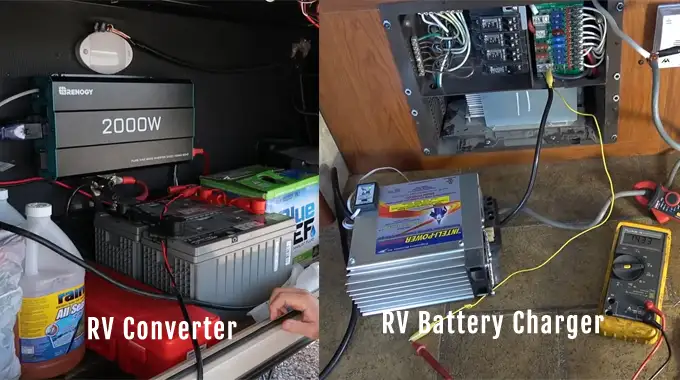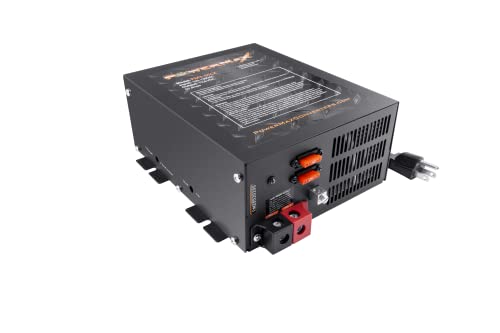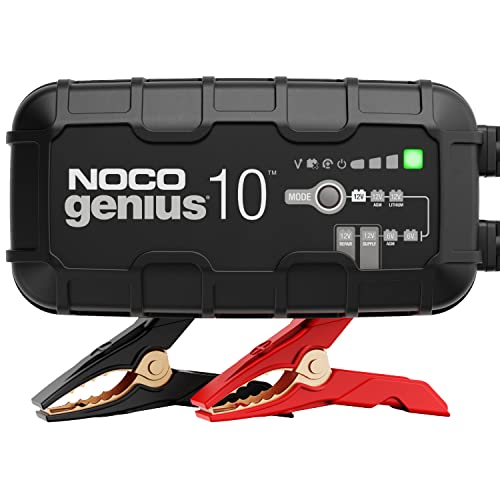Last Updated on July 15, 2024
Don’t be left in the lurch. It’s important to know the difference between your RV Converter and Battery Charger. Not knowing could leave you stranded without an electric system. You’ll need a converter to keep your electrical system running, while a charger is designed solely for battery maintenance.
That’s why some RVs have both. Each serves a different purpose for optimal power usage. RV converters and battery chargers may seem like similar devices on the surface, but they provide very different functions.
If you don’t know when to use which one, it could cost you big time in repairs. If that’s the case, this article breaks down two devices: converters and battery chargers; to help make sense of it all. It’s a great read for those who want to stay up-to-date on their experience and expertise in engine systems.
RV Converter vs. Battery Charger: Comparison
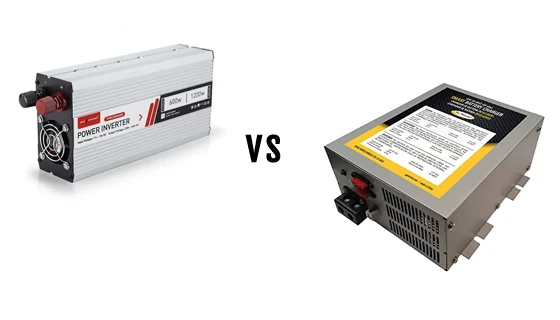
Both are designed to supply power to a vehicle, but each has its own unique features that make it suitable for different applications, so it’s essential to know when to use each device type.
Power Requirements
The power requirements of RV converters and RV battery chargers can vary significantly depending on the chosen models. RV converters usually require an input power that is between 105 volts and 125 volts AC. Whereas RV battery chargers typically require a much higher input power ranging from 200 volts to 280 volts AC.
The size of the converter or charger needed for a particular RV will largely depend on the amount of energy it needs to provide. Generally speaking, the higher the wattage rating, the more energy it can deliver to your RV’s electrical systems.
When selecting an RV converter or charger, it is essential to ensure that it meets your specific setup’s needs. For example, some models are designed specifically for deep cycle batteries. While others may be better suited for powering standard recreational vehicle appliances such as lights and televisions.
Solar powered battery chargers have unique power requirements that must be considered before purchase. In terms of output voltage and amperage, most basic converters range from 13 volts to 16 volts DC at 15 amps. While more advanced units can reach up to 24 volts DC at 40 amps or even higher levels depending on their specific design.
Higher quality models may have built in overload protection. This is to help protect against potential damage from overcharging or undercharging your battery bank. RV battery chargers may offer a wider range in output voltage and amperage options, with some reaching as high as 28 volts DC at 60 amps or greater.
Understanding the power requirements for both RV converters and chargers is essential. This ensures the safe operation of your recreational vehicle’s electrical system while optimizing its performance.
When selecting either device, it is important to consider its intended use and size to ensure that you are purchasing a unit capable of meeting your specific needs.
Application Use Cases
Each device type has its own particular use cases based on its design and capabilities. Battery chargers are intended for charging lead acid batteries and should not be used with other types of batteries since they could cause damage or reduce performance over time due to improper charges.
RV converters are designed primarily for providing AC or DC power to RVs. They can be used with various types of batteries. But must have the appropriate surge protection features to prevent any damage from occurring due to electric surges or spikes in voltage or current.
Special Device Features
Both device types are equipped with specific features to ensure safe charging and operation. This helps to protect your devices from damage or malfunction caused by electricity surges or incorrect use.
For battery chargers:
This includes temperature control systems. This monitors the temperature during the charging process to prevent overheating or overcharging. This also helps ensure maximum efficiency and long term performance from your batteries.
For RV converters:
Their main feature is surge protection. This ensures that any potential spikes in voltage or current won’t cause short circuits or other electrical issues while they are providing power to your RV’s systems and appliances.
Advantages of RV Converters
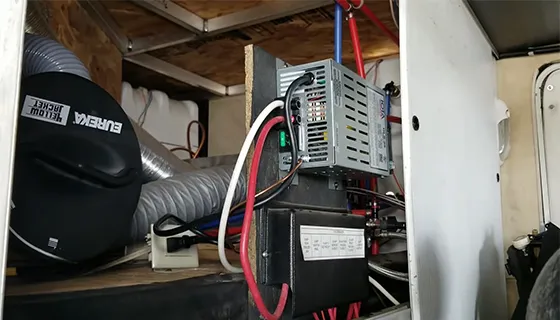
Advantage 1: Easier to Install
RV Converters are an excellent choice when installing recreational vehicles (RV). They require minimal work to get up and running and can be connected directly to the vehicle’s battery. This eliminates the need for complex wiring and avoids potentially dangerous connections with low voltage electrical systems.
RV Converters are also much smaller than other types of charging systems. So they don’t take up too much space in the limited confines of an RV. Many RV Converter models feature plug and play capabilities, allowing for quick and easy installation within minutes.
Advantage 2: Lower Cost Than a Battery Charger
Another great advantage of using an RV Converter is its cost effectiveness compared to a battery charger. Battery chargers can be pricey due to their complexity and require regular maintenance and care to remain reliable and effective.
They may only sometimes adequately charge the RV batteries during extended periods of use since boosters or extra power sources may need to be added. With an RV Converter, you can save money since there’s no need for additional hardware or complicated setups. All you need is a single device that directly plugs into your vehicle’s battery port.
Advantage 3: Low Maintenance and Reliability in Varied Conditions
One of the main benefits of having an RV Converter is its low maintenance requirements over time. Unlike other charging systems, it doesn’t require frequent calibrations or special care to keep functioning at optimal levels.
It needs occasional cleaning or dusting if necessary, making it one of the most reliable charging solutions available on the market today.
Because these devices don’t rely on any complex mechanisms or circuitry as other systems do. They can provide reliable service even under extreme temperature conditions or off the grid locations where traditional power sources may not be available.
Advantage 4: Simultaneously Can Charge both Lead Acid and Lithium ion Batteries
RV converters provide a great advantage to those who own lithium ion batteries and lead acid batteries. With this capability, RV owners can charge both types of batteries simultaneously without purchasing two chargers for each type. RV owners can save time, money, and effort when charging multiple batteries simultaneously.
Some models of RV converters allow the user to adjust the voltage and current settings accordingly. So that each type of battery receives the proper amount of power necessary for them to be safely charged.
This makes charging cells easier. And also helps extend their life expectancy by ensuring they are not being overcharged or undercharged.
Advantage 5: Increased Voltage Capacity for Faster Charging Times
Another advantage of RV converters is their increased voltage capacity compared to other types of chargers. This allows them to charge batteries faster than ever before. With higher voltage capacity, these converters can charge a battery much quicker than traditional chargers while still providing safe operation.
RV converters have the advantage of recharging batteries quickly, thus making them ideal for those in a hurry or who need to get back on the road quickly. Faster charging times reduce the amount of energy used during charging which can help cut costs and electricity consumption overall.
Advantage 6: Provides clean power for Electronics and Appliances
- Controlled, Quiet, Cool Operation – This converter operates quietly and reliably, ensuring excellent…
- Wide voltage range – The PowerMax converter is a flexible power source suitable for various…
- Certified safety – Rest easy with the PowerMax converter, a trusted choice for safety. It holds…
Besides providing clean power for appliances and electronic devices, these devices convert 12V DC from a battery source into 120V AC power with minimal interference from electrical noise or harmonic distortion. This could otherwise cause damage or disruption in electronics or any sensitive appliances connected to it, such as computers.
Due to this feature, they are ideal for those who like to use laptops, phones, tablets, TVs, etc., while on the go. Since they will be provided with reliable power instead of something potentially unstable or dangerous due to interference issues. As common with other types of generators or even many regular outlets found in homes today.
This feature also ensures that any electronic equipment attached won’t be damaged due to improper current flow. As this could otherwise fry components within them if using inadequate power supplies from an incompatible source such as a car battery.
Advantage 7: Simple Troubleshooting for Issues
A significant benefit of RV converters is their ease of troubleshooting in case of any issues. RV converters are designed to be user friendly, with straightforward interfaces and a number of helpful indicators. These help quickly diagnose any problems that might arise.
For example, many models feature LED lights that indicate voltage levels and power output. Making it easy for owners to identify any wiring issues or other complications that might be affecting performance.
Many models also come with detailed user manuals or technical support services from the manufacturer. Allowing RV owners to find solutions for even complex troubleshooting issues easily.
Advantage 8: More Flexible Installation Options with Longer Output Cables
RV converters are also advantageous because they provide more flexible installation options thanks to their longer output cables. Many manufacturers offer 50 foot long cords on some models.
The converter can be connected to the outlets in the RV or to external power sources like generators or shore power.
This makes it easier for owners to install the converter in hard to reach places without worrying about cable length being an issue.
Advantage 9: Many Models Include Built Safety Features
RV converters also offer an essential safety benefit due to the presence of built in safety features. Safety features like surge protection, overload protection, short circuit protection, reverse polarity protection, and temperature monitoring.
The converter is equipped with these features to protect the equipment connected to it. Providing additional safeguards against accidental damage caused by power surges or excessive heat buildup during operation to those operating it.
This can prevent costly repairs associated with damaged electronics and injuries caused by electrical shock from faulty wiring or overheating components due to incorrect wattage ratings.
As such, these safety features make RV converters an excellent choice for owners who prioritize reliable performance and peace of mind while on the road enjoying their vacation time away from home.
Advantages of RV Battery Chargers

Advantage 01: Easy to Use and Install
RV battery chargers are designed to be easy to use and install. RV battery chargers are ideal for campers and recreational vehicle owners who are often on the go. These devices typically come with detailed instructions on how to set up the unit. This allows even novice users to get started right away.
Most RV battery chargers feature all in one designs that make it easy to plug and play without requiring additional wiring or setup. This can be especially helpful when you’re in a hurry or don’t have the tools needed for a more complicated installation.
Advantage 02: No Need to Monitor or Perform Maintenance on the Unit During Operation
One of the most significant advantages of RV battery chargers is that they don’t require any monitoring during operation. This means that you can focus on other tasks while your device does its job.
There is often little need for maintenance beyond ensuring that your power supply is connected correctly and unplugging it when not in use. This makes them ideal for those who need an easy solution that requires minimal effort from start to finish.
Advantage 03: High Efficiency in All Conditions
- Meet the GENIUS10 – Similar to our G7200, just better. It’s 17% smaller and delivers over 115% more…
- Do more with Genius – Designed for 6-volt and 12-volt sealed lead-acid automotive, marine, RV,…
- Enjoy precision charging – An integrated digital thermal sensor detects the ambient temperature and…
RV battery chargers are built to be reliable and efficient in all conditions. This means they can withstand extreme temperatures and fluctuations in power quality and frequency without compromising performance or longevity.
This allows users to depend on their device working as intended regardless of where they may be camping or traveling, giving peace of mind knowing their batteries will receive optimal charging protection no matter what the conditions may be like outside.
Advantage 04: Ability to Charge Different Battery Types With Adjustable Voltage Settings
Many modern RV battery chargers come with adjustable voltage settings that allow users to choose the specific charge rate required by a particular type of battery used in their vehicle.
This means campers can ensure optimal charging performance whether they are using traditional lead acid batteries or newer types like lithium ion batteries, which require precise voltages for safe charging operation.
It also means that users won’t have to purchase multiple units if they need different settings for different types of batteries; instead, they can simply adjust their existing charger as necessary, saving time and money in the long run.
Advantage 05: Some Models Include Advanced Options Like Desulfation Mode and Restart/Recondition Settings
Specific models offer advanced features such as desulfation mode for those looking for even more functionality out of their RV battery charger.
By removing sulfation caused by overcharging or undercharging, the desulfation mode prolongs the life of lead acid batteries. Restart or recondition settings that provide automatic recovery after an unexpected situation occurs.
Even temperature compensation capabilities help keep your device running at peak efficiency regardless of outdoor conditions.
Advantage 06: Greater Variety is Available at Different Price Points
One great perk about choosing an RV battery charger is that a wide selection is provided at different price points depending on your budget. From basic entry level models perfect for occasional users to more powerful professional grade versions suitable for extended usage, there’s something out there that is sure to meet everyone’s needs.
Many manufacturers offer warranties ranging from one year to five years, so you can rest assured knowing your purchase is backed up by reliable customer service should anything ever go wrong during the operation.
Advantage 07: RV Battery Chargers are More portable than RV Converters
Another significant advantage of RV battery chargers is their portability. Unlike most other types of power sources, these units are small enough to fit into any vehicle’s trunk or even inside a backpack if necessary. This makes them easy to transport and use wherever power is needed.
Many travel trailers have factory installed battery charging systems, so no additional equipment is necessary when traveling with an RV battery charger already installed. This means it’s possible to have reliable power while moving with minimal hassle and no extra expense.
Differences between RV Converter and RV Battery Charger

Input Voltage
RV converters require a 120 volt input, while battery chargers require a much lower voltage. This is because RV converters convert the higher voltage of a typical power outlet into the lower voltage necessary to power the appliances, lighting, and electronics in an RV.
The voltage required by a battery charger depends on the type and size of the RV battery being charged, but it typically ranges from 6 volts to 24 volts.
Output Voltage
The output voltage provided by an RV converter is usually between 13 volts and 15 volts, enough to run lights, fans, and other smaller appliances in an RV without damaging them. Battery chargers also provide different output voltages depending on the battery.
Amperage
As mentioned above, the amperage rating of an RV converter is set differently depending on its purpose. It may range from 10 amps to 30 amps or more. The amperage rating of a battery charger varies according to the size and type of RV battery that needs charging.
For example, some models may provide up to 40 amps for large lead acid batteries. Many battery chargers feature adjustable settings or come with multiple charging profiles that can be selected according to the type of battery being charged.
Maintenance Requirements for Your RV Battery Charger and RV Converter
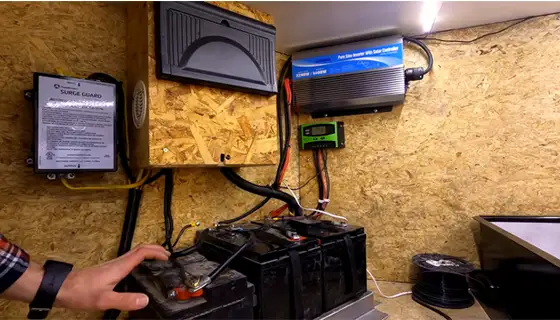
Proper maintenance can ensure that your battery charger and converter work at peak efficiency and prevent unforeseen problems. For starters, you’ll want to ensure both devices are kept clean and free from dust particles build up, which can interfere with electrical connections or cause further damage.
Avoid letting either device become too hot due to extended use. If you notice either your battery charger or converter becoming overly warm. It’s best practice to disconnect them until temperatures return back down within normal ranges.
Other tips include periodically checking cables for wear or fraying and replacing any cables if necessary. Visually inspecting connectors for buildup or corrosion should be cleaned (if possible) or replaced if extensive damage is present.
Will Your RV Work Without a Converter?
The answer is yes. Your RV can work without a converter in some cases. This is usually only true if the RV is equipped with batteries and other energy related components that can provide power without needing a converter.
You’ll need to ensure that the RV is appropriately equipped with the right electrical components. You’ll need a battery, an alternator, and a 12 volt DC power source. With these components in place, your RV can provide power for lights, appliances, and other electronics without needing an external converter.
Most RVs will require some form of electrical conversion when using electricity from an external source, such as the public grid or a generator. With this conversion, the RV may be able to draw power from those sources.
It’s important to note that while it may be possible to run some appliances and electronics in your RV without a converter, it’s not advisable to do so for extended periods due to safety concerns and damage issues that could arise over time if not monitored closely.
Additionally, many modern RVs come with built in converters that change AC to DC power to draw from external sources and operate all necessary appliances in the RV.
Suppose you plan on traveling with your RV. In that case, having a converter is essential to ensure all the proper connections are available when plugged into campsite outlets throughout different locations. In short, while it is possible to operate an RV without a converter in certain circumstances, using one is typically more efficient and reliable when available.
How To Know if Your RV Converter is Charging Your Battery?
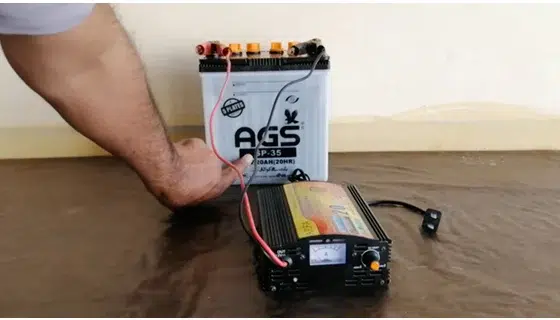
If you need help determining whether or not your RV’s converter is charging your battery correctly, there are a few steps you can take to check. Inspect the battery’s voltage on its digital display or with a multimeter to determine whether it’s receiving a steady voltage source from the converter.
A fully charged 12 volt battery should read between 12.6 and 13 volts, while a 6 volt battery should read between 6.3 and 6.8 volts. Check the connection between the converter and your RV’s electrical system to ensure power flows between them appropriately.
Ensure all plugs are securely connected, and cables are in good condition with no kinks or damage to the insulation of wires inside. Look for any signs of excessive heat coming from the converter or your RV’s batteries when charging, as this could indicate an overload on one of the components or a potential short circuit in your wiring.
If you notice any excessive heat coming from either component, turn off all power sources immediately and contact an electrician for professional advice and assistance with repairs before continuing to use your RV’s electrical system again.
Test the outlets around your RV to see if they have sufficient power when connected to the converter if they don’t.
Then chances are that there may be something wrong with either your converter or its connection to your RV’s electrical system, which needs further investigation by a qualified professional electrician before continuing usage of the converter.
Listen closely for buzzing, humming, or other strange noises coming from your RV’s batteries or its converter. These can indicate loose connections, malfunctions within circuitry, or a problem with how much electricity is being sent through it at any given time.
So take appropriate action depending on what you hear and contact a qualified electrician if necessary before using it again in future applications where safety is paramount.
Last update on 2025-04-03 / Affiliate links / Images from Amazon Product Advertising API

